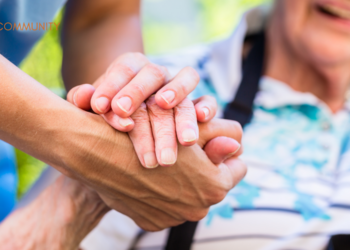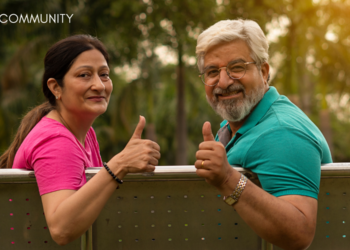Let me start this article with a reference to a dialogue from the epic movie Taare Zameen Par by superstar Aamir Khan. There is a scene where the child’s parent tries to convince the teacher that he cares for his son. The teacher says when you care for people, it acts as a healing balm for all issues. It reassures the person there is someone always available to love, share, listen and discuss issues. In other words, it means there is someone to fall back on, to hold your hand, a shoulder to cry on, and so on.
It is so true, especially for our aged people. Sometimes, being busy in our lives, we do not realise how they feel sidelined and useless. The worst part is when they do not have someone to talk to, share their fears, allay their doubts, and give them the confidence that there is someone who will have their back. They must know they are not alone and belong to our society as an integral part of it, completing it in many ways. That’s what constitutes emotional support.

Join Now >
What studies say
Multiple studies to understand the impact of lack of emotional support on seniors have concluded that it can increase the risk of loneliness and isolation, anxiety, depression, and other health issues. Sometimes, it can even lead to premature death. Not that we needed the studies to know what it means to our elders. Indeed, when aged people get the required emotional support, they live their golden years in peace and happiness, with enhanced well-being.
But why is it so essential that we must talk about it? Are our elders not getting the support they need? Knowingly, unknowingly, that might be the case. And there are always the aberrations wherein something drastically goes wrong. Like the children emotionally to their parents for property and so on. Here are some crucial insights shared by WHO.
One out of six elders experience abuse, mostly from their caregivers. Around 14% of seniors have some mental disorder. This aspect accounts for 10.6% of the disabilities suffered by people over 60 years. Hence, we have programs like the UN Decade of Healthy Ageing from 2021 to 2030. The program collaborates with global governments to ensure that aged people can combat ageism through economic development, creating age-friendly environments, providing integrated care, and ensuring long-term care where needed.
Such programs aim to ensure the ageing population gets the best support they need in inequitable environments to aid their well-being. By providing such support, we, as a society, can add quality to quantity and help them live better for however long they do.
How can you build a support system?
It’s highly appreciable if you have caring children or family members or a reliable emotional support network with whom you can discuss all your issues freely. If not, it is essential to build one. Often, we hide our problems out of fear of what the society will say. People are happy to talk about issues in other families, even while hiding theirs. But there are always one or two close contacts with whom we can share issues to discuss and understand if we need to do something about it. It could be emotional or physical abuse, financial abuse, etc.
Sometimes, when we discuss things, we may be able to see them from a different perspective, as at times, we may also overreact to situations or people or what they said or did. That’s why we must have an emotional support system.
It helps you see objectively, understand other perspectives, and seek help if and when needed. If you prefer talking to strangers to seek support, you could consider consulting professional counsellors who can guide you. Also, almost every state has set up senior helpline numbers that you can avail of. The national senior helpline number is 14567. All these options give us a sense of security and peace of mind. Thankfully, we also have senior communities like Samarth to whom you can reach out. What is crucial is to remember that there is someone to whom we can reach out, no matter what.










